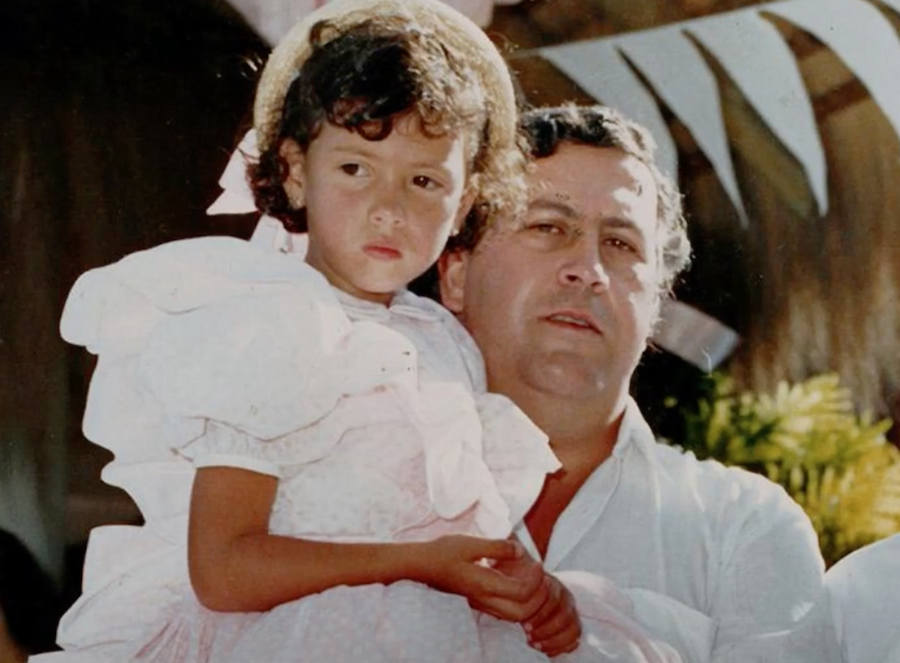Manuela Escobar: Untold Story Of Pablo Escobar's Daughter
Can a life defined by familial ties to infamy ever truly escape its shadow? Manuela Escobar, the daughter of the notorious drug lord Pablo Escobar, embodies this question, forever linked to a past that shaped her present and continues to influence her future.
Born on May 25, 1984, during the height of her fathers illicit empire, Manuela experienced a childhood of unparalleled privilege and luxury. Pablo Escobar, a man known for his ruthlessness, doted on his daughter, showering her with affection and material possessions. He reportedly wanted to fulfill all her dreams, even gifting her a unicorn when she was young. This early life, a stark contrast to the violence and fear that permeated the world outside their opulent existence, laid the foundation for a complex and often tragic journey.
| Attribute | Details |
|---|---|
| Full Name | Manuela Escobar Henao (formerly) / Juana Manuela Marroqun Santos (current) |
| Date of Birth | May 25, 1984 |
| Place of Birth | Colombia |
| Father | Pablo Escobar |
| Mother | Maria Victoria Henao |
| Siblings | Juan Pablo Escobar Henao (Sebastin Marroqun) |
| Known For | Daughter of Pablo Escobar; Her life post-Pablo Escobar; public figure; businesswoman |
| Current Status | Private, residing in Argentina |
| Education | Homeschooled |
| Legal Status | Never involved in criminal activities |
| Alias | Juana Manuela Marroqun Santos |
| Residence after 1993 | Argentina |
| Marital Status | Unknown |
| Children | Unknown |
| Website (Reference) | Wikipedia: Manuela Escobar |
Manuela's life, however, took a dramatic turn with her father's death in 1993. At just nine years old, she lost not only her father but also the world of security and opulence that had been her reality. The family, including her mother and brother, fled Colombia, seeking refuge in Argentina. In a move to distance themselves from their past and ensure their safety, they adopted new identities, with Manuela becoming Juana Manuela Marroqun Santos. This transition marked the beginning of a new chapter, one defined by a desperate attempt to escape the legacy of her father.
The shadow of Pablo Escobar, however, proved long. In 2015, reports surfaced suggesting that Manuela lived in constant fear of retaliation from her father's enemies. The weight of her past, the notoriety of her family, and the ever-present threat of violence created a difficult environment for her. It has been reported that she has dealt with depression, and at some point in her life, she considered suicide.
Unlike other children her age, Manuela was homeschooled, further isolating her from the outside world and contributing to her unique upbringing. This, coupled with her father's influence, helped to shape who she is today.
The story of Manuela Escobar is a testament to the enduring power of family, legacy, and the complexities of identity. While her brother, now known as Sebastin Marroqun, has embraced the public eye, writing books and giving interviews about his family's past, Manuela has remained largely out of the spotlight. This deliberate choice suggests a desire for privacy, for a life free from the relentless scrutiny and judgment that come with being the daughter of one of history's most infamous criminals.
Narcos' first two seasons showed the rise of Pablo Escobar from a small-time dealer to a notorious drug lord and offered a look into his home life as a father and husband. This dramatization, while fictionalized, brought Manuela's childhood into the public consciousness.
The decision to change her name and relocate to Argentina signifies a conscious effort to break free from the past, to forge a new identity separate from the shadow of her father. But the legacy of Pablo Escobar is not so easily erased. Manuela's name, regardless of the one she uses, will forever be associated with the drug lord. The fact that she has never been involved in any crimes is notable and offers a glimpse into her character and her commitment to not following in her fathers footsteps.
Yet, the desire for anonymity is understandable. The media and the public have always been fascinated by Pablo Escobar's family, with Manuela becoming a subject of intense interest. This attention, coupled with the ever-present threat of violence, has led her to lead a life of seclusion. The limited information available about her current life and activities only fuels the mystery surrounding her.
Manuelas life post-Escobar has been marked by resilience and a longing for normalcy. However, she, like her family, had to deal with the financial fallout from his illicit activities. The family's finances became a significant point of contention. The legal battles over her father's wealth, coupled with the constant threat to their safety, added to their challenges.
The challenges Manuela faced, from the loss of her father to the constant fear for her safety, reflect the devastating impact of violence and crime on the lives of innocent people. Her story serves as a stark reminder of the human cost of the drug trade and the lasting consequences it can have on families and communities. Manuelas story is also a story of survival, hope, and the ongoing struggle to escape the past.
In Argentina, the family attempted to build a new life, far from the violence and danger of their former existence. Manuelas life, though, has continued to be shaped by the events of her childhood. Even today, it is a story of a woman who is linked to both riches and violence.
Her brother, Juan Pablo, has spoken about the family's experiences in interviews and books, shedding some light on their lives and the emotional toll of their situation. His perspective offers a valuable insight, even if Manuela herself has chosen to stay out of the public eye.
Pablo Escobar's actions were the subject of extensive media coverage, but the stories surrounding his daughter were limited. She was shielded from the public eye, perhaps in an attempt to protect her. This separation, coupled with her efforts to build a new identity, makes her a fascinating subject of study and consideration.
Manuela Escobar's life is a complex one, marked by privilege, tragedy, and resilience. She represents a poignant example of how the actions of one person can have a profound impact on the lives of those around them, particularly those closest to them. Her story continues to intrigue and captivate, a reminder of the enduring power of family, the enduring legacy of a criminal empire, and the complexities of human identity.
The media often portrays Manuela as a woman with a melancholic personality. She transitioned from having everything she wanted as a child to a life under constant threat and scrutiny. Her life is a reflection of the tragic side of her father's actions.
While Manuela Escobar's current financial status remains largely unknown, it is likely she had access to the inheritance that came with her father's legacy, as well as whatever assets her family managed to retain or salvage after escaping from Colombia. This wealth, however, would be forever intertwined with the bloody source of her fathers empire.
Manuelas childhood was spent in a world of luxury. Even during the height of her father's empire, she lived a life of privilege and comfort. The drastic change she underwent after his death, a stark contrast to the opulent life she once led, is a powerful illustration of her situation.
The life of Manuela Escobar, therefore, stands as a testament to the complexities of identity and the enduring consequences of her father's actions, which is a narrative of survival and a search for normalcy that will always be influenced by a past forever intertwined with both opulence and infamy.



Detail Author:
- Name : Merle Kilback PhD
- Email : akassulke@pfannerstill.com
- Birthdate : 1987-03-05
- Address : 4527 Carter Common Morganville, ME 93452-3788
- Phone : +1-989-587-1363
- Company : Rohan-Hettinger
- Job : Sawing Machine Setter
- Bio : Praesentium aut vel reprehenderit fugit consectetur. Aspernatur dolore fugit eaque voluptatem.